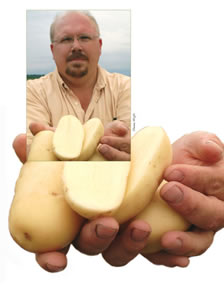|
|
Low-Carb Potato Headed To Florida Fieldsdownloadable pdf
Potatoes may be on the no-no list for high-protein diets, but a University of Florida researcher says a new low-carb potato will help win back die-hard carbohydrate counters.
"Consumers are going to love the flavor and appearance of this potato and the fact that it has 30 percent fewer carbohydrates compared to a standard Russet baking potato," said Chad Hutchinson, an assistant professor of horticulture with UF's Institute of Food and Agricultural Sciences. >"The potato doesn't look or taste like anything that's now on the market, and it's not a genetically engineered crop," Hutchinson said. "When it comes to beautiful potatoes, this one is a real winner for growers and consumers." Hutchinson said five seasons of evaluation in his research program at Available to consumers in January 2005, the new spud will be marketed under a yet-to-be determined name, and it is expected to be a boon for Florida's $120 million potato industry. Hutchinson said 3 ounces of the new potato contains about 13 grams of carbohydrate compared to around 19 grams in the same size serving of a Russet Burbank potato. "Although potatoes are not part of the Atkins diet, the fact of the matter is that potatoes contain no fat and they are a good source of fiber, protein and vitamins. They have vitamin C and B-6 and are low in sodium and high in potassium. And, potato skins are an excellent source of fiber," Hutchinson said. Independent research in Canada confirmed the spud's low-carbohydrate profile. Hutchinson said it is due in part to the lower specific gravity, which relates to the amount of starch in the potato, compared to the more widely recognized Russet Burbank baking potato. "The smooth, buff-colored skin and light yellow flesh will make this potato an attractive and tasty alternative in many traditional potato recipes," he said. Don Northcott, marketing manager for HZPC Americas Corp., said the potato can be harvested in 65 to 75 days, compared to more than 100 days for existing potato varieties grown in Florida. The shorter growing period will allow spring and fall crops to be produced for harvesting from January through June. Chad Hutchinson, cmhutchinson@ifas.ufl
|

